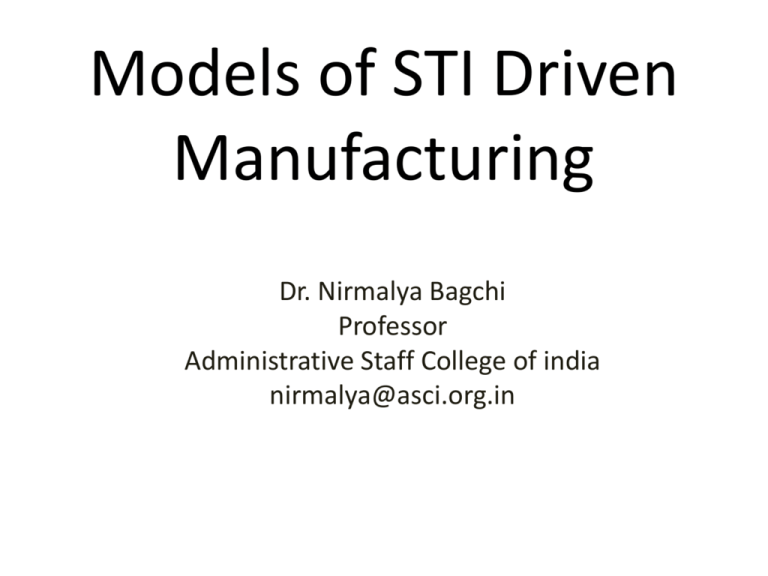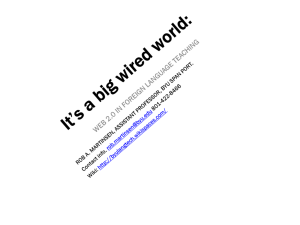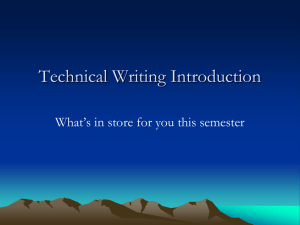Models of STI Driven Manufacturing by Dr. Nirmalya Bagchi
advertisement

Models of STI Driven Manufacturing Dr. Nirmalya Bagchi Professor Administrative Staff College of india nirmalya@asci.org.in What to Make in India • Low Tech – Low CAPEX, labour intensive – Polluting, labour issues, large land requirements, resource intensive, High non tech barriers to entry • High Tech – High CAPEX, tech intensive – Non polluting, less land intensive, highly skill intensive, highly R&D intensive, low non tech barriers to entry • • • • • • • Military Industrial Complex Oriented? Export Oriented? Demand Driven? Supply Driven ? Achieving Economies of Scale – like China ? Innovation Driven? Small scale, large scale, start up? Low Technology Intensity High Labour Intensity Eg. Garments High Technology Intensity High Labour Intensity Eg. ICT Low Technology Intensity Low Labour Intensity Eg. Weaving High Technology Intensity Low Labour Intensity Eg. Robotics driven manufacturing HOW OTHER COUNTRIES HAVE ACHIEVED MANUFACTURING LED GROWTH SME based traditional manufacturing: Germany • Mittelstadt – – – – – – – – – Small town in Germany SME hub of Germany 99% classical industrial era companies Provides 60% of employment in Germany No nanotechnology, no biotechnology, no ICT just plain vanilla old tech companies Most companies in Mittelstadt have no Bank loans Up to 500 employees and Annual Saes of up to 50 million Euros Stability and not growth is the focus does not supply large customers more than 10% of sales! Risk mitigation Innovation driven manufacturing growth: Sweden, Finland • Robust linkages between Industry ad Academics • Great facility for prototyping, test sites and demonstration • Challenge driven R&D and Innovation leading to High Tech manufacturing • Leveraging public R&D spending for Innovation • Involvement of end-users early in the process • Increased demand for cross collaborations • Open processes Start up led manufacturing growth: Israel • Israel is a start up nation. Produces more start ups than Japan, China, India, Korea, Canada and UK • Attracts 30 times more venture capital investment than Europe • Attracts twice as much venture capital investment per person than the US • It has more tech companies on NASDAQ, a tech oriented stock exchange than all of Europe, India and China put together • A recent survey published in Ivey Business journal reports that – while high tech proliferates in Israel traditional industries are R&D averse. 57 % of such firms operate in low tech and medium tech and do not have any R&D division, 20% do not invest in any R&D, and 25% have no R&D personnel. • This disparity has been acknowledged in the comprehensive “Israel 2028” policy report which advocates a dual economy. • Innovation is also acknowledged as a stimulus of economic growth • OCS • More than 50% of the start up companies employ people from elite military units in management. • Preconditions for government entry 1. Market Failure Conditions 2. Government as a Catalyst 3. Share Risk (Lowered Risk) 4. Predetermined Exit Conditions 5. No Government Control 6. Indirect Investments (Funds) 7. Partnering with experience groups • R&D Fund • Grants up to 50% of R&D expenditure. • If R&D fails, no repayment, If R&D succeeds, 3-4% of sales as royalty • Each year 1000 projects are taken up and about 500 companies are given grants, ~2000 requests per year • Supports competitive R&D of mature companies (SME’s as well as big companies) • Target: establish and develop substantial industrial R&D infrastructure • Grants between 30-50% of R&D plan, royalties payments obligatory upon success • Acquisition and transfer of knowledge due to special approvals • Budgetary platform for all bilateral parallel agreements • Technology Business Incubators • Pre Seed and Seed • Nascent companies to start up stage • 24 Incubators • 2 Industrial Incubators • 1 Biotechnology incubator • 8-10 projects in each • Grants- up to 85% • Complimentary Programs – BIRD etc. • Magnet Generic R&D • Supports consortia of industrial companies and academic institutions. • Target: jointly develop generic, pre competitive technologies or dissemination existing new technologies. • The technology cannot be acquired from commercial sources at competitive prices • Grants of up to 66% - no royalty repayments • Magneton, which is a scheme for promoting technology transfer from academic institutions to industry. • Noffar, which is a programme to support applied academic research in biotechnology and nano-technology in order to promote the transfer of technology in these areas. • Tnufa, which encourages and supports technological entrepreneurship and innovation at the early stage i.e. pre-seed stage. The assistance is given to individual inventors and startup companies. OCS Government Support Programs Pre-Seed Generic R&D Competitive R&D Cooperative R&D TNUFA Technological Incubators NOFAR International KAMIN Applied Academic Research MAGNET Industrial R&D MAGNETON Long-Range R&D ISERD (Europe FP) Bi-national Funds Bi-national Agreements EUREKA Galileo Global Enterprises R&D Collaboration Framework Basic R&D Market Proximity 12 Mixed industry cluster based approach: France • Public research : more than 166 000 employees, including 99 000 researchers • Private research : more than 221 000 employees, including 129 000 researchers • 83 universities and 100 engineering and business Schools • More than 30 research establishments (e.g. CEA,CNRS, INSERM, INRA, INRIA, CEA, CNES…) Competitiveness Clusters • 71 clusters in biotechnologies, materials, energies, chemistry, aeronautics, electronics, pharmacy ... • Targeting identified markets • 3 types of partners : industry, public research and higher education CARNOT • 34 public research institutes showing significant interactions with industry • 17 000 full time staff • 6 500 PhD students Model for India • • Both Low tech, high labour and high tech high labour to create ripple effects in both directions Creating space for SME – Defence production, niche technology capability, Design capability – Barriers to entry – Promoting Cluster Development • Tech Innovation driven, start up driven – Need a framework for government financing and advising start-ups and SMEs with provision for equity stake in return. • • Need an entity with new rules and practices Need new practices and rules of audit – Culture of Innovation and Entrepreneurship in • • • • Colleges, Institutes and Universities R&D institutions Industry Leveraging R&D base for tech development and innovation – Need an organization that liaises with S&T as well as Industry including start-ups, SMEs and large firms. – Competitive funding schemes – PPP IP value Govt. Support HE PPP’s Govt. Support S&T Govt. Support New Entity Commercial? Basic Research Applied Research Tech Development Stages and Time Manufacturing Thank You





